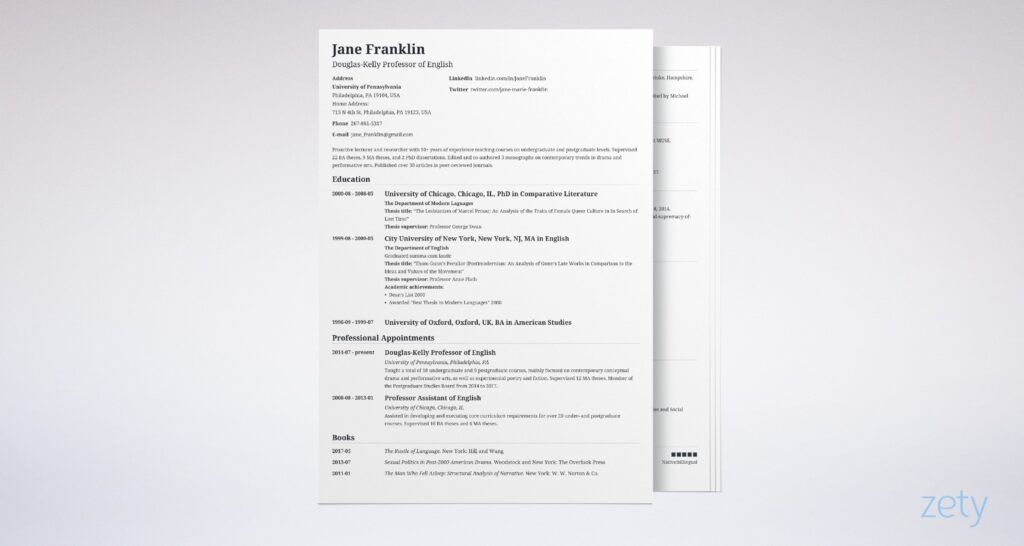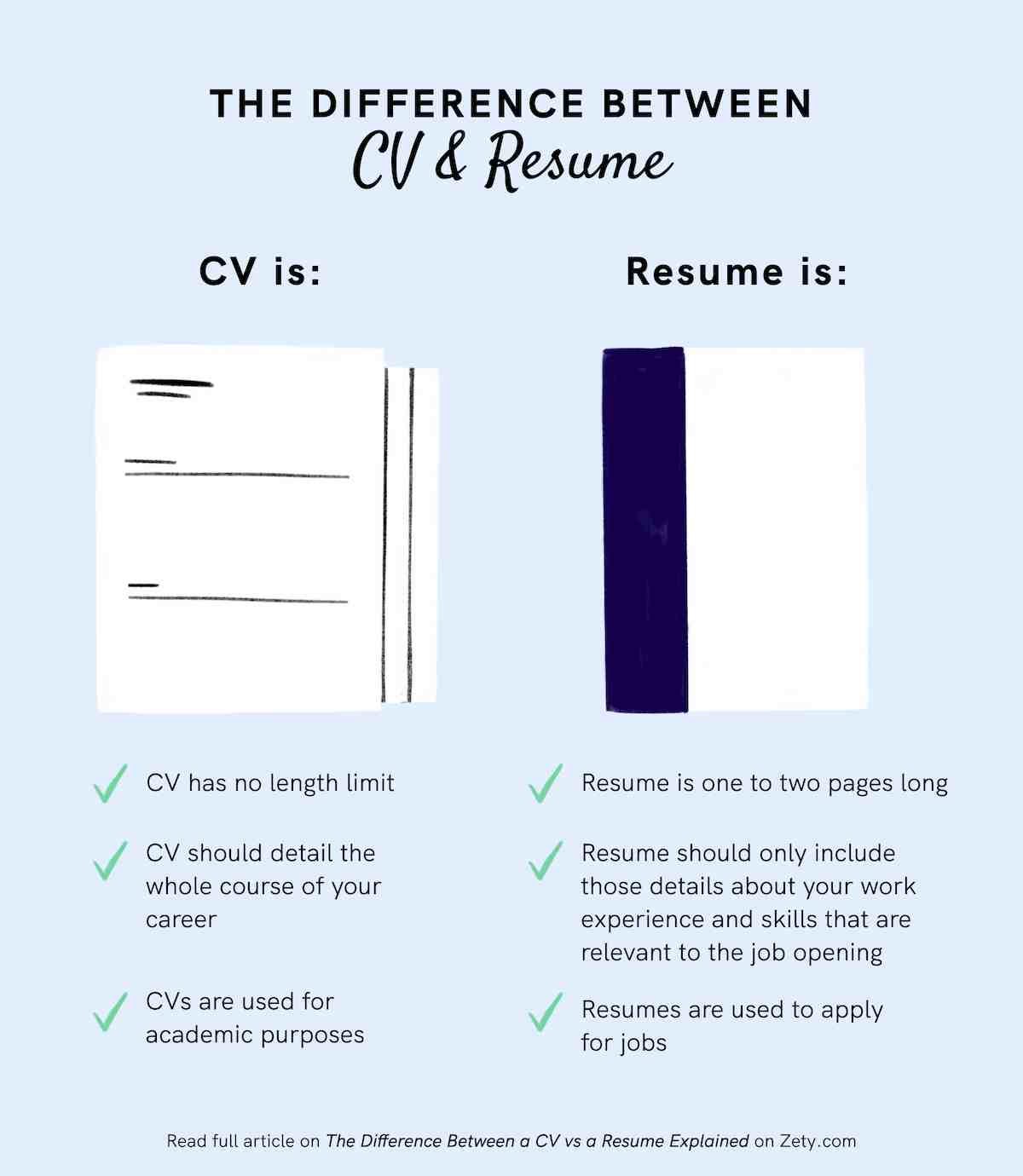If you are looking for a job, you have likely been asked to present your resume and/or CV. But what’s the difference? And which should you use? In this guide, we will outline the differences between a resume and a CV, and explain why each is important in the job search process.
What is a difference between CV and resume?
A resume is a document that lists your education, work experience, skills, and other information about you. A CV is a document that emphasizes your education, work experience, and skills.
Resume vs. CV:
-A resume is typically one page long and focuses on your education and work experience.
-A CV usually spans two or more pages and includes information about your skills and achievements.
-A resume is typically designed to get you an interview. A CV can be used to get any job you want.
-Resumes are often printed out and handed to someone hiring for a position. CVs are often saved electronically and can be accessed anywhere.
Can I use a CV instead of a resume?

When applying for a job, many professionals choose to use a resume over a CV. A resume is simply a list of your experiences and skills, while a CV is more comprehensive and tailored to the specific job you are applying to.
There are several reasons to choose a resume over a CV. A resume is shorter and can be emailed or posted online. Resumes are also easily searchable on the internet, making them more accessible. Additionally, many employers prefer resumes because they are usually less time-consuming to review.
However, there are times when using a resume may be preferable. If you have only worked in jobs that don’t require detailed experience or skills descriptions, using a resume may be the best option. If you have experience in several industries or with varying types of jobs, a CV may be better suited for you.
Ultimately, it is important to decide what works best for you when creating your career marketing materials. When choosing between a resume and a CV, keep in mind the type of position you are applying for, how much detail you want to include, and how accessible your materials will be.
Do employers prefer CV or resume?
There is no one-size-fits-all answer to this question, as the decision between a CV and resume will vary depending on the specific job you are applying for and the company’s hiring processes.
CV vs. resume: What’s the difference?
A CV (curriculum vitae) is a document that contains your education, work experience, and other relevant information about you.
A resume is a document that highlights your qualifications for a particular job, and is designed to help you stand out from the competition.
Some key differences between a CV and resume include:
1. A CV is longer than a resume. A typical CV includes sections for education, work experience, skills, and other important information. A resume typically contains just the highlights of your employment history, with less detail than found in a CV. This makes a CV more comprehensive but may also make it harder to read and understand.
2. A CV is often tailored to each individual applicant. A resume is generally generic, which means that it can be used by any applicant who meets the required qualifications. While this may be helpful if you are applying to many positions with the same company, it may not be as beneficial
How many pages should a CV be?
A resume is typically two to four pages, whereas a CV can be up to 10 or more pages. The length of a resume will depend on the position and experience of the individual, while the length of a CV will largely depend on the industry you are targeting.
A resume should be designed to highlight your skills and achievements in a simple, chronological fashion while a CV should focus on your experience and skills specific to the position you are applying for. A resume may include information about your education and work history, while a CV should highlight specific experiences that relate to the job you are applying for.
When compiling your resume, be sure to list all jobs held, including positions that required little or no managerial or professional experience. Conversely, be sure to highlight only positions that you have held where you received significant responsibility and played an active role in achieving results. In addition, list only jobs for which you received formal recognition such as awards or reviews. Do not include volunteer work or positions at small businesses.
Finally, be sure to format your resume and CV according to the specific job application requirements. For example, most employers prefer resumes formatted in reverse chronological order with titles followed by dates, while most recruiters prefer CVs formatted in
When should a CV be used?
The answer to this question depends on your specific career and experience. The following are general guidelines, but always consult with an expert if you have any questions about which format would be the best fit for your situation:
If you are looking for a direct-hire position, a resume is generally the best way to go. A resume can highlight your skills and experience in a more detailed and organized way than a CV.
If you are self-employed or want to market yourself as an executive or entrepreneur, using a CV may be more appropriate. A CV shows off your work history, achievements, and skills in an impressive and cohesive way. It also helps potential employers get a sense of your personality and character.
If you are applying for lower-level positions that do not require a college degree or professional experience, either format may work. However, if you are targeting jobs that require additional education or certification, a resume is likely to be more beneficial.
What is CV slang for?
A resume is a document that introduces you to potential employers, detailing your education and work experience. It’s typically two or three pages long and includes your name, contact information, summary of skills and accomplishments, and goals.
A curriculum vitae (CV) is a document that introduces you to potential employers, detailing your education and work experience. It’s typically one or two pages long and includes your name, contact information, summary of skills and accomplishments, and goals.
How do I write a good CV?
A good CV is a concise summary of your skills, experience, and accomplishments. It should be formatted in a professional manner and highlight your strongest points.
A resume is a different type of document altogether. A resume is designed to show potential employers what you have to offer them in terms of skills, qualifications, and experiences. It should be concise and highlight your key achievements.
There are many differences between a CV and a resume, but the most important thing to remember is to tailor each one to the specific job you’re applying for. If you’re not sure which format to use, consult with an experienced career counselor or employer recruiter.
When should you change resume to CV?
There are two main reasons you might want to make the switch from a resume to a CV: formatting and audience.
When it comes to formatting, a resume is typically designed for one specific audience: recruiters. A CV, on the other hand, is designed for any potential employer who might be looking at your work history and skills. This means that your resume should be more comprehensive and organized, and it should be geared towards demonstrating your strengths as an employee.
When it comes to audience, resumes are typically sent to employers who are specifically hiring for certain positions. A CV, on the other hand, can be sent to any employer who is interested in learning more about you. This means that a CV can be more targeted and persuasive when trying to get an interview or landing a job.
Can a resume be 2 pages?
A lot has changed since the days of simply listing your job titles and years of experience on a single sheet of paper. Technology has given us the ability to showcase our skills in a more complete way, and there are now many different formats available when creating a resume.
In this full guide, we’ll discuss what CV vs Resume is, the different types of resumes, and the benefits and drawbacks of each type. We’ll also provide some tips on how to create the perfect resume for you. So let’s get started!
Does UK use CV or resume?
UK uses resume as the main way to find a job. However, if you are applying for a job in the United States, Canada or Australia, you will need to submit a CV. A resume is a type of document that is used when applying for a job. It typically contains your education and work experience, and can be tailored to different industries.

